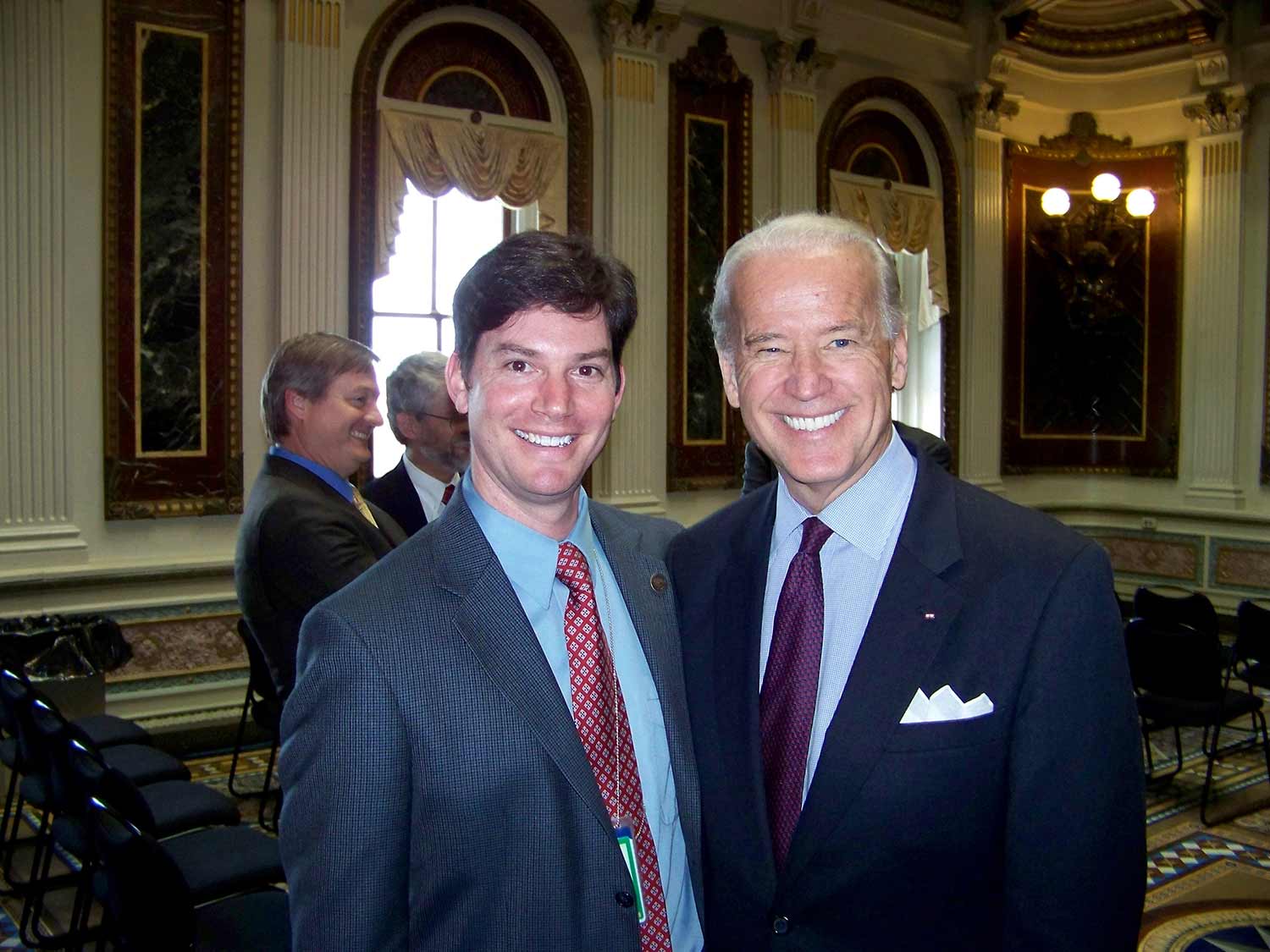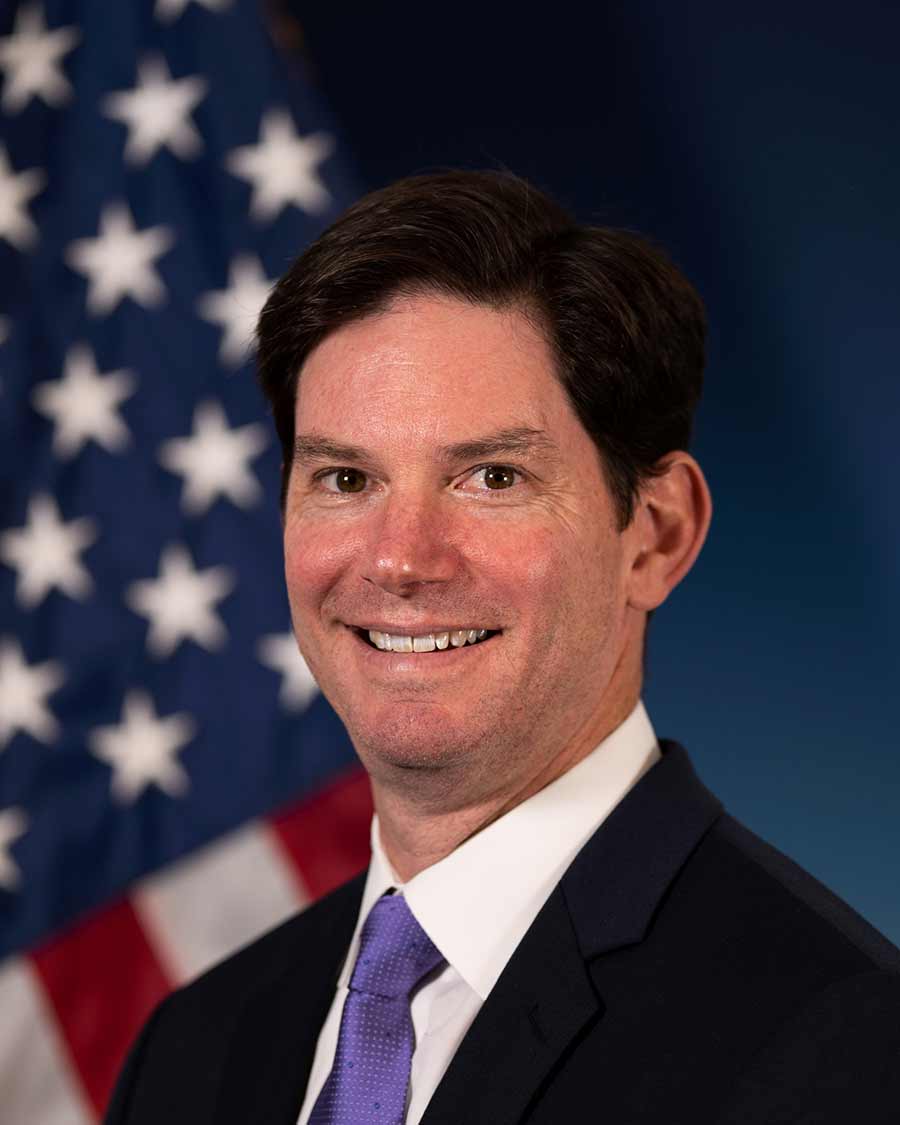
By:
- Cynthia Dillon
Published Date
By:
- Cynthia Dillon
Share This:

Seth Cohen, when he served at the White House Office of Science and Technology Policy, pictured with then Vice President Joe Biden. Photo courtesy of Seth Cohen, UC San Diego Division of Physical Sciences
On the Frontlines of Science Policymaking
UC San Diego professor maneuvers between chemistry labs and service at the White House and beyond, calling scientists to civic duty
UC San Diego chemist Seth Cohen is helping to shape the trajectory of science in the U.S. With a serious interest in civics and public policy since high school, Cohen double-majored in chemistry and political science in college. As a newly tenured professor at UC San Diego 10 years ago, he took the opportunity of a fellowship to blend his interests in science and policy on a new level.
As a fellow of the American Association for the Advancement of Science, Cohen served in the White House Office of Science and Technology Policy (OSTP) during the transition between Presidents George W. Bush and Barack Obama. In the role, Cohen facilitated high-level interactions among federal agencies with a stake in science and contributed to key policy documents governing the nation’s scientific agenda. Now, he is serving a second round of civic service as a program manager at the Defense Advanced Research Projects Agency (DARPA).
“I was looking for opportunities to return to D.C. and science policy opportunities,” said Cohen, a professor of chemistry and biochemistry. “I had heard great things about working at DARPA from people like Dean Al Pisano and Chancellor Pradeep Khosla. That simulated some of my interest in applying to DARPA for a position.”
DARPA program managers, like Cohen, are empowered to design new technical initiatives and to serve as thought leaders among world-class researchers from academia, industry and government. About a year into his new federal role, Cohenlooks forward to the scientific and technical advancements that will come out of the programs in which he has had a hand.
“If successful, the programs that I initiated at DARPA could have significant impacts on human health and well-being,” he said.

Professor of Chemistry and Biochemistry Seth Cohen. Photo courtesy of Seth Cohen, UC San Diego Physical Sciences
According to Cohen, science- and fact-driven policymaking is incredibly important—as seen in this era of COVID-19. He said that most scientists not already working for the government have a reputation for not being particularly engaged in policy or civics.
“Whether true or not, I hope that the events of the last year show how important it is for scientists to be engaged to help inform the public, as well as government decision makers, to make wise choices and policies that benefit and protect our people,” Cohen said, adding that he has found that those in government and positions of power greatly value scientific information and someone who can communicate it to them clearly and succinctly.
The founder of the Cohen Research Group pointed out that we all live in a global, technology-based world—from the internet and smart phones, to environmental health and pandemic disease—which will only continue to be addressed through science and technology.
“We live longer and healthier, have amenities and luxuries and connect with the world in ways no one could have imagined, thanks to advancements in science and technology,” he said. “Perhaps like most other professions, we need to be our own best advocate and let others know about all the important work we are doing, as well as the amazing students we are training to be the scientific leaders of the future.”
Cohen noted that just as civics, art and culture are all important for a healthy and vibrant society, so is the advancement of science and understanding of the natural world—not just for the practitioner, but the non-expert as well. So he encourages science students and faculty alike to write opinion pieces for newspapers and magazines, to speak at public events and to engage neighbors, families and friends.
“At OSTP, I was deeply involved in efforts centered on scientific integrity in the federal government that allowed me to work with senior scientists from across many federal agencies. Professionally that was the most rewarding and memorable experience. Personally, the opportunity to give my family and friends—including a number of UC San Diego faculty and my research group at the time—tours of the West Wing was incredibly memorable,” he said.
Cohen said that one way for scientists to get a taste of policymaking is through the Day One Project, launched in January 2020 through the Federation of American Scientists. The project’s goal is to democratize the policymaking process by engaging new and expert voices to develop concrete ideas in science and technology, which the next administration can implement. Currently, the project is working to solicit actionable policy ideas and to develop a list of the top federal government positions where experience in science and technology is most important.
“I encourage other scientists to consider their own tours of public service, whether at the local, regional or national level. Having a better understanding of the federal research enterprise—as well as how the federal funds that we so desperately apply for are distributed, allocated and prioritized—is invaluable for any career scientist,” said Cohen. “Any honest academic would acknowledge that they have complained about the federal funding systems. I challenge those who have to spend time working within those system, to understand and improve them. I also encourage other scientists to get involved sooner rather than later.”
Cohen also noted that a detour to the government is more than a career boost; it’s a privilege and an enriching and enlightening personal experience.
“Public service broadens your perspective on the issues that face our society and is an exciting opportunity to give back to the government and taxpayers that support us and the privileged careers we enjoy as scientists in the United States,” he said.
Share This:
You May Also Like
Stay in the Know
Keep up with all the latest from UC San Diego. Subscribe to the newsletter today.


